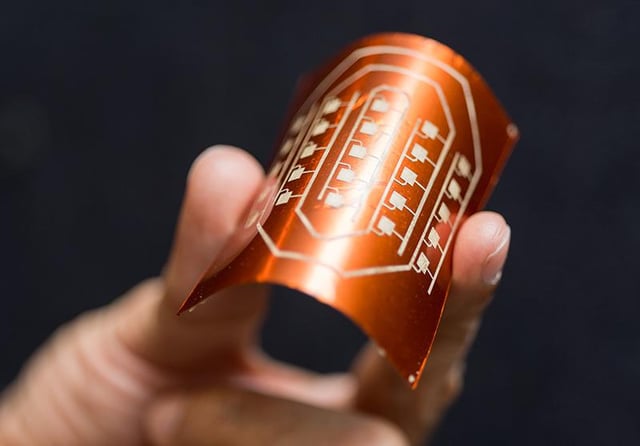There is increasing demand for electronic systems that are flexible and have the ability to sense, process, take action, and communicate with other devices and networks. Important applications include human performance monitoring devices such as “smart” bandages for medical treatment and asset and environmental monitoring systems
However, current devices are limited by the performance of flexible electronics, typically comprised of simple devices printed on polymer films or other flexible materials, and by the traditional packaging of semiconductor chips, which are bulky and inflexible. Flexible hybrid electronics (FHE) is an emerging technology category that combines thin semiconductor chips and printed devices on flexible substrates, enabling high performance systems that can be worn on the body, integrated into clothing or other materials, or built into structures such as vehicles and infrastructure. Asset and environmental monitoring systems include areas such as:

They may also be used to monitor the structural integrity of assets. Current research by UMass Lowell is focusing on the tracking and optimization of performance by people and high-value materials and products. This project will create scaled processes for dielectric substrates and conductive patterning in order to advance the manufacturability of printed radio-frequency (RF) electronics essential to wireless monitoring and communications. A leader in plastics engineering, UMass Lowell will team with Raytheon Corp to accelerate adoption of multi-functional substrates that are compatible with a broad range of inks and printing processes.
The project will leverage advanced RF component and manufacturing technologies to develop two manufacturing processes – one to scale creation of these substrates, and one to scale printing on them. Once fully characterized, these multi-functional substrates will be integrated into conformal antennas and tunable conformal-frequency selective surfaces as initial demonstration vehicles.
![]()
![]()
Environmental exposure history, especially temperature, is crucial for assessing and maintaining viability of high-value items including pharmaceuticals, life science materials, industrial supplies and food during shipment and storage. American Semiconductor will deliver low profile, physically flexible Smart-Tags capable of automatically logging environmental data and wirelessly transmitting the data using an industry-standard RFID protocol. This low-cost flexible hybrid electronics system will include a flexible antenna, battery, complex integrated circuit and wireless communications. The Smart-Tag will be supported by a full product infrastructure of readers, documentation, test data, volume manufacturing flows and a clear commercialization path. Boise State University will provide workforce development, education and training for FHE design and manufacturing. Installation of the Smart-Tags and a reader infrastructure at NextFlex will highlight FHE technology and manufacturing process capabilities to encourage designers and OEMs to incorporate FHE into their future products.
| Phone: | (310) 263-3060 |
|---|---|
| Contact CMTC: | Contact CMTC Here |
| Address: |
California Manufacturing Technology Consulting® (CMTC) |